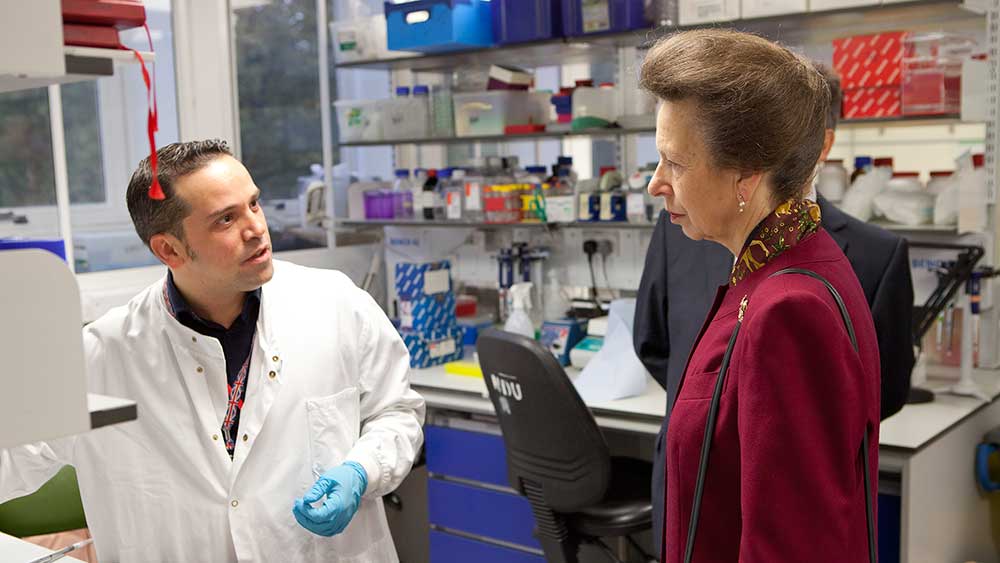“The research of today is the treatment of tomorrow”
Professor Michael A Patton (Newlife Trustee)
Medical research was one of the cornerstone on which Newlife was founded. Over the years, Newlife invested more than £16 million in over 300 individual projects at more than 80 research institutions across the UK. This pioneering medical research has provided real hope for the future, with more than 50 disease-causing genes being identified and new treatment projects funded. Newlife also offered a ten-year medical training programme which helped over 60 students get an insight into the world of research. While research is no longer a main focus for the charity, the legacy of Newlife’s pioneering research programme lives on.

The Newlife Birth Defects Research Centre was opened at the Institute of Child Health in London, by HRH the Princess Royal, in 2012. It is Europe’s biggest centre dedicated to research into birth defects, which is the number one threat to child health in the world today.
Pioneering Medical Research
Below are the details of some of the ground-breaking medical research that Newlife has funded over the years.
Full Grants
| Date | Research Area | Institution |
| 7 February 2019 | Gene Therapy Skin Disease & Netherton Syndrome | Institute of Child Health UCL |
| 7 February 2019 | Microcephaly | MRC Human Genetics Unit – Edinburgh |
| 7 February 2019 | MRI in Mircocephaly / Fetal MRI | University of Sheffield |
| 9 February 2018 | Micro Syndrome | University of Leeds |
| 9 February 2018 | PAX6 and Eye Malformations | University of Edinburgh |
| 9 February 2018 | Skull Treatment | Newlife Birth Defects Centre – London |
| 9 February 2018 | Understanding Genetic Mutations | University of Oxford |
| 3 February 2017 | Autism – Discovery of new gene (KPTN) as cause of Autism | University of Exeter Medical School |
| 3 February 2017 | Spina Bifida – Searching for New Genes in Spina Bifida | University College London Hospitals NHS |
| 3 February 2017 | Understanding the Developmental Delay in Kabuki Syndrome | St Mary’s Hospital – Manchester |
| 3 February 2017 | Ushers Syndrome – Stem Cell therapy for Ushers Syndrome | Newlife Birth Defects Centre – London |
| 21 January 2016 | Bladder Exstrophy | St Mary’s Hospital – Manchester |
Start Up Grants
| Date | Research Area | Institution |
| 29 March 2019 | Disease modelling of the rare genetic bone disorder, Hajdu-Cheney Syndrome, Using pluripotent cells and drug repurposing. | Kings College London |
| 29 March 2019 | Exploring FGF-21 As a Potential Treatment of Mitochondrial disease | University of Oxford |
| 29 March 2019 | Novel Candidate genes underlying autosomal recessive neurodevelopmental disorders with intellectual disability | St George’s Hospital – London |
| 9 March 2018 | Chromosome Division – Chromosome Abnormalities, Downs Syndrome | University of Bristol |
| 9 March 2018 | Developing a new technique for MRI imaging in skull malformations – Craniosynostosis; hemifacial microsomia; MRI scanning | Addenbrookes Hospital University of Cambridge |
| 9 March 2018 | Genetic Predisposition to Fetal CMV infection – Deafness; Intrauterine infection; CMV | University College Hospital – London |
| 9 March 2018 | Genetics of Hirschsprung Disease | University of Oxford |
| 9 March 2018 | Stem cell investigation of cerebellar development – Cerebellar malformation; brain malformation; stem cell | Newlife Birth Defects Centre – London |
| 9 March 2018 | Surgical outcome in Hirschsprungs disease – Hirschsprung’s disease; surgical outcome | University of Oxford |
| 19 December 2017 | Osteogenesis Imperfecta | University of Sheffield |
| 22 March 2017 | Congenital Heart Disease – Exosome signalling in Heart Development | Liverpool John Moores University |
| 16 March 2016 | Lung Malformation Registry | University of Southampton |
| 16 March 2016 | Weidmann-Steiner Syndrome – The WiSH Study | Great Ormond Street Hospital – London |
| 25 March 2015 | Neurofibromatosis – Gene Splicing in Neurofibromatosis | University of Southampton |
| 21 October 2014 | Club Foot – Club Foot Abnormalities & Quality of life study | Oxford University Hospital NHS Trust |
